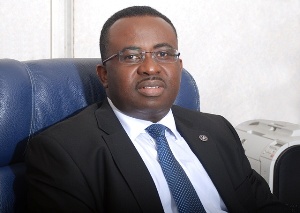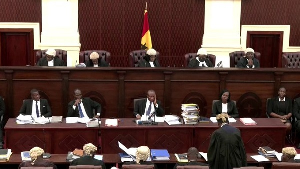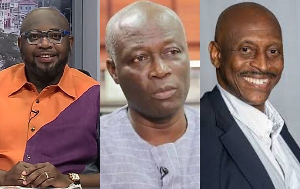The Bank of Ghana has assured the public that it will work harder to stem the volatility in the foreign exchange market to bring about price stability.
The Bank of Ghana has assured the public that it will work harder to stem the volatility in the foreign exchange market to bring about price stability.
The assurance was given when officials of the Bank appeared before the Public Accounts Committee of Parliament to answer questions on the Report of the Auditor-General on Foreign Exchange Receipts and Payments of the Bank for the half year ended June 30 and December 31, 2015 respectively.
2nd Deputy Governor Johnson Asiamah told the PAC that as a result of pragmatic measures and monitoring systems put in place, the central bank was optimistic that this year would not witness extreme return of the previous volatilities as compared to the previous years.
According to him, the 2017 budget has better prospects in tackling the situation.
"The budget is very hopeful in tackling the situation. There is no cause for alarm," Dr. Asiamah told PAC.
"The stability would continue. Anything you do has a cost. We at the Bank are working hard to stop the volatilities. Frequent big swings of the account is one thing we are preventing. We don't react frequently when there is panic reaction in the markets. We need to ensure stability at all front," he stressed.
Dr Asiamah assured the Committee that foreign exchange and payments receipts in and out of the country would see a positive turn since the Bank has a team that is constantly regulating the markets.
He said one area the Bank was looking at was to develop the non-traditional sector, as well as to see to the external sector for ultimate growth, adding, "Good policies offered by the BoG are resulting in positive results."
He emphasized that commodity prices in the global environment was not within the domain of the Bank.
He was, however, quick to add: "We cannot sit aloof. We have a mandate and we will use those mandates appropriately to achieve better results.”
The PAC observed that there were huge variances and variations in the projections of cash flows in the 2015 period by the Bank.
An example was cited in the area of manganese export where a total of $50milllion was projected but the actual realization was $9million.
The Governor explained that due to fluctuations in the prices of commodities in the world market it became difficult for the producers of those commodities to relax in production, thereby throwing the projections out of gear.
On the monitoring of the corresponding bank balance as far as the export and retention of forex is concerned, he told the PAC that the Bank, together with the GCNET, has a system that monitors and checks export of gold.
The Committee was particular about the exportation of the precious commodities since it has the potential to bring in inflows of foreign exchange to cushion the strength of the Cedi.
The Governor acknowledged the sentiments of the members and reiterated that central bank is the custodian of forex in and outside Ghana and therefore there are internal control mechanisms in place to check all system lapses.
The governor took time to explain how the bonds issued by government are utilized.
He said the bonds issued by government are monies that are brought into the accounts of the bank in dollars and as and when the government needs the monies, the bank gives cedis to government for its expenditure.
"As and when the government spends the monies for its project, the monies sits in the accounts of the Bank of Ghana," he added.
The PAC expressed reservation about the huge expenditure with regards to embassy transfers, as captured by the 2015 Report of the Auditor-General.
The Governor craved the indulgence of the Committee to seek clarification from the Foreign Ministry in order not to 'jump the gun'.
The chairman of the PAC, James Avedzi, assured the BoG and its representatives of the Committee's support in making the central bank work for the benefit of Ghana.
Other officials at the PAC hearing included Eric Hammond, Assistant Director, Banking Department; Felix Adu, Chief Internal Auditor; Peggy Osei-Tutu Dzordzormenyo, Head of Banking; Ken Adu, Assistant Director, Banking Department; Stephen Opata, Assistant Director, Financial Market Department; and Peter Gyekye Aboagye, Chief Manager, Financial Market Department.
Click to view details



Business News of Wednesday, 26 April 2017
Source: thestatesmanonline.com

















